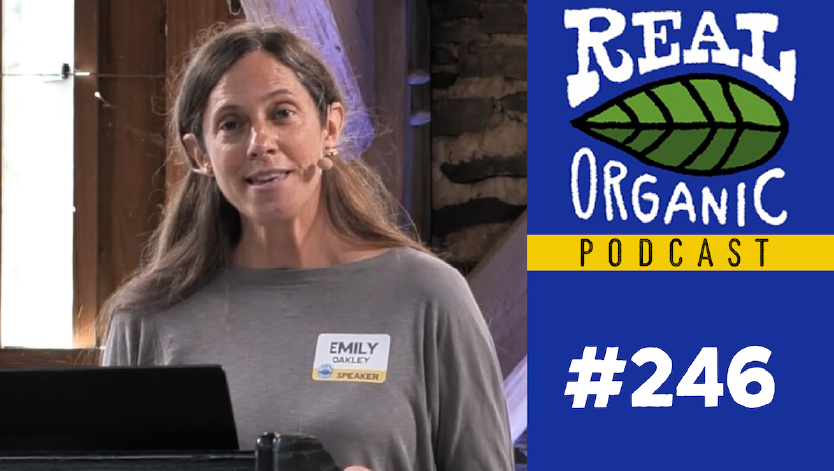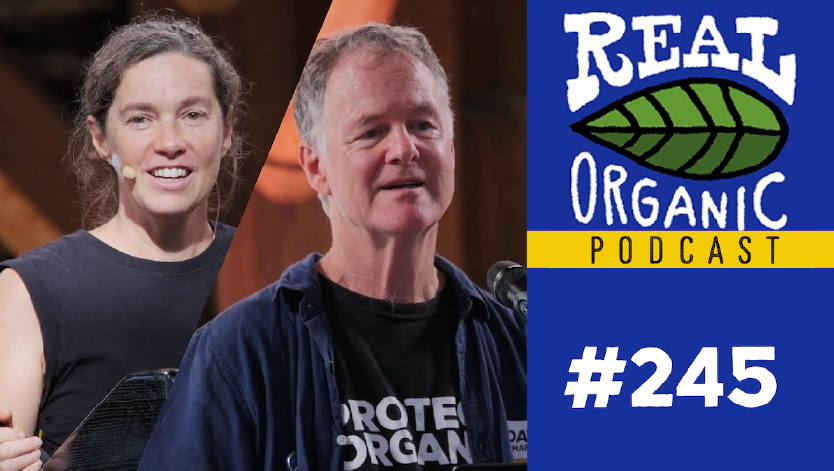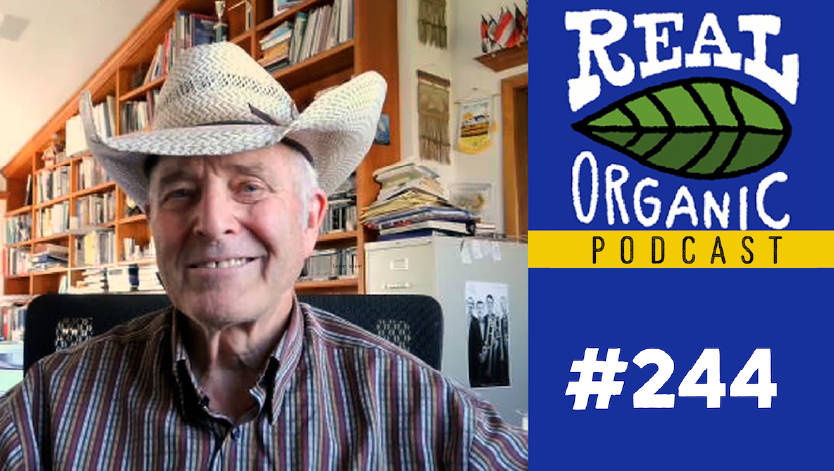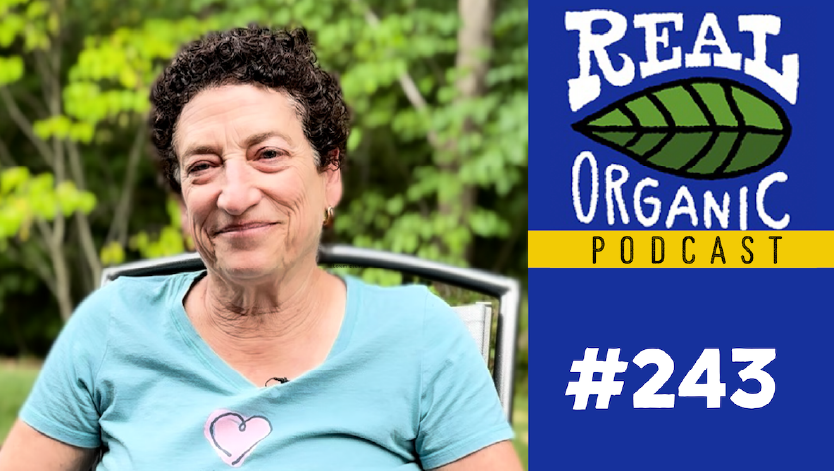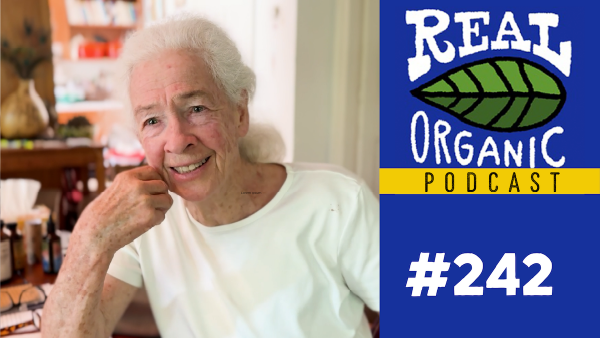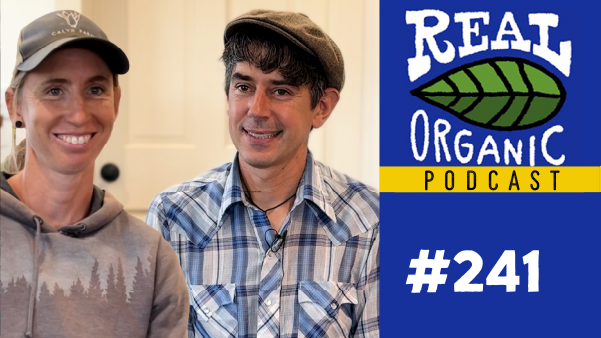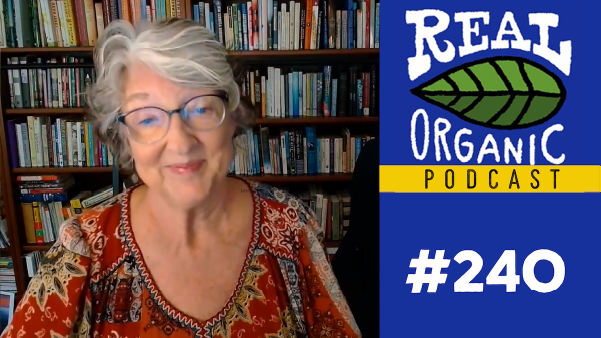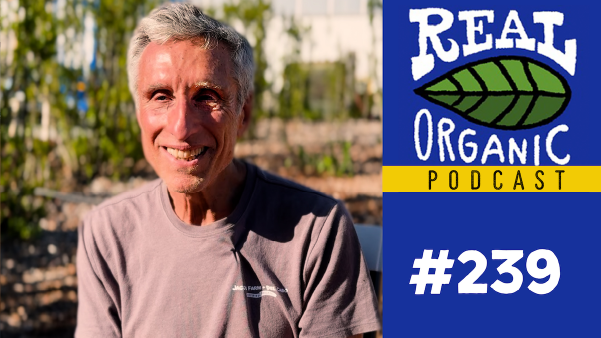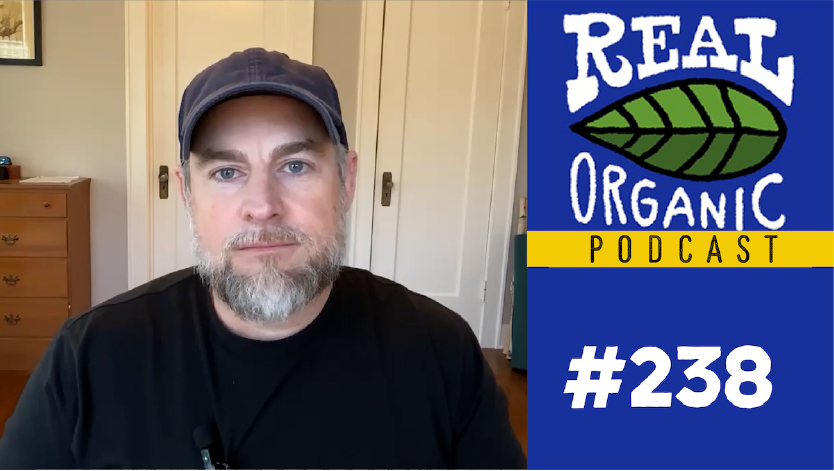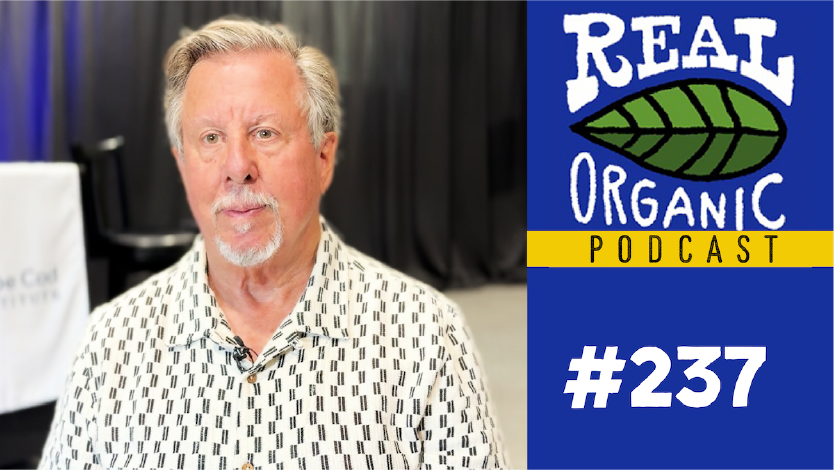Bonus Episode, Oct 21, 2024
Dave Chapman at Churchtown Dairy 2024: Real Organic Project
Welcome! You can subscribe and download episodes of our show through your favorite podcast app.
You can also subscribe to receive the video version of each episode on our YouTube channel.
Dave Chapman spoke at Real Organic: A World Movement on the main stage in the Round Barn at Abby Rockefeller’s historic Churchtown Dairy on September 28, 2024.
Dave Chapman 0:01
I’m introducing the next speaker, which is me.
Dave Chapman 0:06
I’m Dave, and the next thing I want to talk about is gratitude. I’m going to read this because it’s a little too long and I would forget, but these are the people that we need to thank. Real Organic exists only through the generosity of all of you. And we made the decision when we started the Real Organic Project, and we decided that we would have a certification program, and we really decided that the farmers were already carrying too many burdens on their backs, and so we would make this free.
Dave Chapman 0:53
Now you’ll hear later from Paul Holmbeck how in Denmark the government pays for this, right? It’s free. The citizens pay for it through the government. Well, we weren’t able to get our government to pay for it, so we’re working on it, but in the meantime, we have to turn directly to the citizens and cut out the middleman. So through the generosity of hundreds of people, we are able to certify farms for free and and keep our team going.
Dave Chapman 1:29
But I want in particular to thank Abby Rockefeller and the Churchtown Dairy and maybe hold your applause, because we want to thank everybody. David and Doug Hollenbeck at the Latner Foundation, Robert Edmiston at the Meshewa Farm Foundation, Mark and Christine at Gaia, Charlie and Leigh Merrinof at the Charleigh Foundation, Glenn Muir, Charlotte Metcalf, the Woodhouse Foundation, the Lintilac Foundation, the TomKat Foundation, Jane and Bill Stetson, Dr Bronners and three very generous anonymous donors. So, now you can thank them.
Dave Chapman 2:04
Yeah, one of those three very generous anonymous donors is genuinely anonymous. I have no idea who they are, and they sent us $100,000 this spring. And I know, I know. And Hugh Kent said, “Well, geez, Dave, now you have to be nice to everybody.” So if I’m really nice to you, you know why; you might be the one secret Santa.
Dave Chapman 2:40
Okay, so I wanted to start with talking about something that Michael Pollan said in In Defense Of Food. This book, Michael has written very many significant things about food, and In Defense Of Food, he wrote a famous poem, or haiku, that went “eat food, not too much, mostly plants”. Now I know that a few people in this audience will say, “What do you mean mostly plants? I’m a vegan. It should be all plants and other people here.” Glenn, I don’t know where you are, but you’d say, What do you mean? Mostly plants should be mostly meat, as long as it’s grown in the right way, produced in the right way. So we’ll say that there can be some debate on on the last one, but there’s a beautiful thing, and it’s only whatever 10 syllables, and it’s easy to remember, and it’s a pretty good guide.
Dave Chapman 3:41
There’s a lot of depth there, but I have to disagree with Michael, because it should be added to that “mostly real organic.” And I’m actually not joking about this, because if food is not grown organically at this point in time, it’s mostly grown chemically, and it mostly has biocides on it or in it, and we can’t ignore that or forget about it. So if we’re talking about how we should eat and how we should encourage others to eat, we really want them to eat mostly organic food. And of course, if everybody did, the world would look totally different.
Dave Chapman 4:28
Mark Schatzker, I’m going to show a lot of pictures from our podcast, so anybody who doesn’t know we have a podcast, and it comes out as a video and it comes out as an audio and we got, we’ve done about 200 episodes that are not quite all released yet, and they’re pretty amazing. And I’ve gotten to talk to all kinds of really interesting people who are different faces of the organic movement. Organic isn’t just about farming, and it’s not just about how we grow the food, that is the heart of it, but it’s how do we prepare the food, how do we sell the food, how do we buy the food? How do we work with a government that puts a tremendous amount of our money into influencing how the food is grown, and most of that money does not go towards organic, it goes towards chemicals.
Dave Chapman 5:24
And, you know, Mark Schatzker has really taught me a lot about ultraprocessed food, and it’s not just about salt, fat and sugar, it’s also about the additives that are used to create not not bliss, but craving. You know, “Bet you can’t just eat one,” right? That’s a true slogan, and it’s not an accident. And he, in his last book, he writes fascinatingly about the difference between bliss and desire and and the food is engineered to create. Desire creates all kinds of problems, and we’re so confused because they do that by putting things in that signal to our bodies that it has something that we want and need, but it’s now a false promise, Real Organic Project is a response to all of that nonsense, right?
Dave Chapman 6:27
This is, this is Hugh and Lisa’s farm in Florida, where they grow amazing blueberries that deliver on the promise. So this is Vincent Stanley. He’s Yvonne chouinard’s Nephew, and he was the sales manager at Patagonia for many years. He’s a neighbor of Eliot’s, and I interviewed him in Eliot’s living room. He said something amazing in this last interview. He said a sense of agency is more important than a sense of optimism. I’ve gotten in trouble before speaking, because I’m not much of an optimist, and I’m not without hope, but I don’t really think things are going to turn out great, but I think that this is Yvonne, I think came up with this, and he’s not an optimist either, but he’s done a tremendous amount to change our world in ways that he thought were the were for the better, including giving his company to the planet. Right? He actually did that. So Patagonia is now owned by the planet. So important to think about this today. What’s our sense of agency? What do we think we can do, regardless of whether it’s going to turn out all that well? Another thing that came out in one of my interviews, this is Mark and Kristin Kimball. Kristin spoke here last year at this none of this works without activist eaters. So we can have activist farmers, but those activist farmers will all fail if we don’t have activist eaters. This movement needs to be a combination of, we’re all eaters, so everyone’s on that team, but the eaters can’t do it without the farmers. We’ve got to have people who are actually growing the real food. So together, we do this. Paul Mueller’s in here somewhere, and, oh, there he is. And we were at a thing out in California, and he got up and talked about tractor Cade. I don’t know if anybody here remembers tractor Cade, but back in the 70s, a whole bunch of pissed off farmers because the farm prices were crashing, drove their tractors across America to Washington, DC, and it created quite a mess. You can imagine hundreds and hundreds and hundreds of tractors pulling into DC, and they camped out on the mall for about a month. And they were the they were the homeless people, and they were doing this to protest what was happening. They were losing their farms, and it got an amazing amount of press, and it changed. Nothing, nothing changed. So Paul told that story. He probably told it better than me, but he told that story because what they didn’t have was a coalition of farmers and eaters, right? We will never call them consumers again, right? A coalition of farmers and eaters working together for their common cause. So that’s the activist eaters to go with the activist farmers. We can only do this together. Okay, it’s easy to become overwhelmed by the enormity of the task at hand, so we have to start a little bit smaller and think about what we put on our plate and where we buy our food and what we’re willing to pay for it. Right? And what are the local regulations? What are the national regulations? Our agriculture is entirely sculpted by national policy, right? It’s wonderful. The USDA actually has pledged $300 million for transition to organic, which is a wonderful thing, and I’m thrilled that they did that, but they’re putting billions of dollars into chemical agriculture to support it in a million ways, so we need to address that and have our money being spent for better things, for the for the world that we want, and for the agriculture that we want. Okay? Claudia thought maybe I shouldn’t tell this story. So I studied Buddhism in my youth. I was a normal, troubled person. Still am, and everyone who comes to Buddhism comes because they’re suffering, so they find a happy home. And I had a wonderful meditation teacher, Larry Rosenberg, down in Cambridge, and he’s still there. He’s even older than Elliot, right? He’s in his 90s now, and he’s a wonderful teacher. He told a Dharma story one day about watching a movie, a Swedish movie. So it’s getting very complicated now, right? Watching a Swedish movie, and it was about a family in Sweden, and the fascists had taken over. It was World War Two, and they came to the house, and they were socialists. And and the kid hid in the rafters of the house, and they came in, and they beat up the father quite badly. And the father’s on the ground being kicked, and he looks up in the rafters and he sees his son looking down in horror. And the son looks away. He can’t look at this. Later,
Dave Chapman 12:04
he’s in a bed all patched up, slowly healing, and he says to his son, I saw you up in the rafters looking and I saw you look away. He said, We’re socialists. We don’t look away. Okay. Now, Claudia thought that was a little bit of a harsh story, and we’re not all socialists, but the point is, what are we? We’re organic activists, where we’re eaters who care, and in order to do what needs to be done, we can’t look away, and that means we have to look at the actual food system and what’s happening. We can’t just put lipstick on this pig. We have to be honest with ourselves, and and, and we’re going to be compromised, and it’s going to be complicated, but we need to be able to see what’s going on. Claudia’s example was maybe use the example of a doctor, and you don’t want your doctor to look away when something’s wrong. You want them to really pay attention so they can understand how to help you heal. Okay, so that’s a, maybe a nicer one. We’re going to when, as we say, Don’t look away. We’re going to talk about some things that are hard. Eliot already started talking about some things that are hard, but I want you to remember this is Cornel West, who is one of my, my favorite thinkers, and he said, We are not arsonists, we are firefighters, and that’s an important distinction. Just because you happen to be around the burning house doesn’t mean you set the fire. And he went on to say, and we’re fighting that fire because people we love are still in the house. So what do we see when we don’t look away? John ikerd Here, one of the many great interviews is describes a food system in free fall, and he’s an ag economist who somehow left the party and went out and said, This is all wrong. And he didn’t start that way. He started believing that our modern chemical food system was wonderful, and now he believes it’s awful, and he’s really good at understanding it. And be clay talks a great deal about we are what our food ate, right? She and her husband David, wrote that book. And it’s not a perfect book, but it’s a very good examination. First look at the results of your health as a result of how your food was grown, not just Ultra processed food, which is where food is medicine goes in. It’s a wonderful place to go saying we’ve got to stop eating this junk food. Absolutely true. But let’s go one step further and see is a carrot? A carrot? Is there a difference? I saw Dan Kittredge here. I don’t know where anybody is right now, but you know, he’s spending all his time trying to understand what the difference is between this carrot and that carrot and how they were grown. And a lot of people are looking at this now and trying to understand it. It’s complicated. This is not a simple one. I think we’re up to 200,000 identified secondary metabolites that we find in plants. These are compounds. We don’t know what most of them do. We don’t understand any of it. We certainly don’t know how they work together. What we do know is some of them are potent anti carcinogens. What we do know is that they’re there for some reason, as part of evolution, and that animals ate these plants. So I don’t think it’s a mistake, and I don’t think anything is just what are they? The term was something like dark nutrients or something. They didn’t know what they were, right, and so they discounted them, but, but they shouldn’t, you know, even though we can’t understand it doesn’t mean it isn’t important. Alice Waters, she she talks about the delicious revolution. She also talks about 70% of Americans are overweight or obese. Over 50% have diabetes or pre diabetes. The highest cases of mortality are self inflicted at this point, mostly from what we eat, which our diets are nutritionally inadequate, calorie rich and laden with pesticides. And I don’t know about you, but I’m knowing more and more young people who are getting cancer now and who are getting sick and having all these mystery things. And I believe it’s because we are living in this in the shower of chemicals. Jon Tester, one of my favorite interviews. This is something he said at the Organic Farmers Association. We’ll have to bleep part of this out. I got certified through the state of Montana if, in fact, they’re certifying hydroponics. I’m going to find a certifier that doesn’t because that’s bullshit. I’m going to make my opinion heard, and I think you folks ought to make your opinion heard too. So he’s one of my favorite senators. He’s the only, only person in the Senate who’s actually an organic farmer, and Bob Quinn is a neighbor of his and a friend. So he’s the real deal. So walganic, this is Lisa held, and she’s a writer for civil elites, and she has written a beautiful piece on wallanthropy, on the philanthropy of the Walton family and the amazing dilemma that they face, because they actually believe in what they call regenerative agriculture, and I think they mean the best of things by that. And one of them has actually said, We need to stop just going for the cheapest food, and we need to put money into buying good food for our greater health. Well, of course, the greatest source of the cheapest food is Walmart, right? And I think this actually highlights something, which is that it this isn’t just about having great leaders, because the people who run all these corporations, some of them are very good people, very nice people, and they actually believe a lot of what we believe. And they seem to be helpless to change their own companies, because it’s part of a big system that just washes them along. Fred kirschman was once speaking, and somebody said, What would you do if you were secretary of agriculture? And he said, well, that all depends on how long I wanted to be Secretary of Agriculture. And it was the truth, because if Fred kirschman became Secretary of Agriculture, he’d last about 10 minutes before they said, We got to get rid of this guy, right? I broke down, and I put in a slide of somebody who’s going to be speaking Bob. And this Bob Quinn, 60% of this country has at least one chronic disease. 40% have two or more. No country can sustain that, right? So Bob is a wheat farmer, a real organic wheat farmer. He’s about to get certified, but I know he’s real organic, we just haven’t gotten around to the paperwork yet. And the point being, he came to this, and he’s become really interested in food and health, as we all should be, and that’s where organics started. Albert Howard wrote two books. One was called an agriculture. Testament, which is a great deal about compost, and one was called Food and Health soil. Soil and Health, excuse me. And it was about how what happens in the soil dramatically influences our health. So that was the foundation of organic we’ve got to think bigger. Paul Hawken said this to me once when I was visiting and he said, you know, real organic is fantastic, but we’ve got to think bigger. And I’ve been thinking about that ever since. What does that mean? Because I think it’s right. And I think what that means is, if we’re just thinking about how food is grown. For one thing, it’s unrealistic. It’s almost like modern science. We’re just going to as as Stuart Hill says, modern science is you give a mouse a shot and you see what happens, and and, but it’s not looking at the whole system. And so if we think bigger, which I’ve tried to do since then,
Dave Chapman 21:03
we start to see very quickly that we’re talking about all kinds of economics and politics that are intimately woven into this, and that democracy is genuinely threatened because of the way we grow food, right and Zephyr teachouts Better explaining this than me, but that was last year, or maybe next year, but not this year. So just take that one with a grain of salt. But think about the the ways in which democracy is challenged. Certainly if we look at the National Organic Program, we can see that this, this thing that was created in order to protect us organic farmers and eaters from fraud, is seriously compromised now. And I mean, as Elliot would say, it’s no surprise, because the USDA never believed in organic in the first place, but they’re making shifts that go beyond that, and they’re making shifts due to direct corporate influence, and that’s why Adam Smith didn’t believe in large corporations, because he thought they threatened capitalism too much. Amazing. So things can change quickly. This is the Berlin Wall. And, you know, it came down overnight and almost unexpectedly. And there been many things like that where there’s been a tipping point, sometimes a bloody tipping point. You know, the Civil War was a tipping point. And, you know, it ended official slavery, but a lot of people had to die in that process,
Dave Chapman 22:56
when in 1853 slaveholders completely ran the government of this country only, only the House of Representatives was not controlled by Southern slaveholders. They controlled Senate, they controlled the presidency, and they controlled the Supreme Court. And 10 years later, a Republican they didn’t even Republicans didn’t even exist. Then 10 years later, Republican Party, Lincoln was president. We were in a civil war. He gave the Gettysburg Address. And, you know, the Emancipation Proclamation happened in 10 years. So things can happen very quickly when, when it’s ripe. And I tell that to myself, because we’re sometimes facing that big mountain, and we go, this is hopeless. We’re trying to do something that’s not going to work, but we don’t know what’s possible. This is one of our rallies. So we started to come together, which is, I think the most important thing of what we do is people coming together. This one happened to be in Colorado, but we had rallies all over the country. This is now where we have farms all over the country who are certified with us after six years.
Dave Chapman 24:19
It is interesting to me. I have never been to most of these farms, and I don’t know most of the farmers. Our team is so active, and they work so hard, it’s not easy to visit 1000 farms. But you know, if you figure they’re like three people on a farm, some farms have many, many more than that. So, but I’d say at a minimum, there’s, there’s typically three. So that would be 3000 people to come to this conference, if they all could. They could not fit in this room. I mean, they they couldn’t come close. But he’s even more interesting is those 1000 farms are definitely feeding a million people. So what if a million people came? Back to this conference. They don’t even fit on this farm. Never mind in this room. And my point being that we’re more powerful than we realize and what would make us realize it, and what would make it obvious, is when we are connected all those people, all those million people do care about the things that we care about in this room, but they don’t, they haven’t found each other. And the purpose of the real, organic project was to help us find each other and know that we were connected so that we can start to coordinate that effort and accomplish a bit more. So amazingly to me, we send out a weekly letter, and it comes out every Sunday, normally, and Linley, or I write it, and it’s had 2 million opens. I just, you know, it’s still boggling to me that, you know, I’m sure they didn’t all read it carefully, but, but 2 million times have our letters been open and our our podcasts, which are very important to me, I work at it a lot, have been watched or listened to 680,000 times. And some people get remarkably well educated. One guy came and interviewed me. He was English. I think he’s listening now, I hope so. And he was just background for he’s going to interview Elliot, and he was so knew so much about what we were talking about. And I finally said, How did you learn all this? And he said, I listened to your podcast. You can get quite an education. It’s not from me, it’s from all the people that I interview, many of whom are in this room and and from all different angles and perspectives. You know, I interviewed a guy who started a school of psychotherapy. My wife is a psychotherapist, and I’m a very emotionally sensitive and well trained farmer, because I’ve been to a lot of workshops with her and and she knows more about soil and agriculture than almost any therapist we ever met. So and and so I was saying something, oh, I was saying Dick Schwartz, so I interviewed this guy who started a school of psychotherapy called internal family systems. And I thought, This is crazy. It’s relevant, because he is very interested in what it is that limits us from being happy and whole and in organizations too. And I thought, well, this is a little bit of a stretch, but I’m really loving it. And then the other day, somebody, we met somebody, and she said, Oh, you know, I love all your work. And what brought me into it was seeing the interview with Dick Schwartz. So, you know, there are many doors into what we’re doing. Michael Pollan, okay, for me, you know, I don’t agree with everything that Michael believes, and he doesn’t agree with everything I believe, but I think he’s still a great a great champion and warrior. I Okay. So I talked to him about this very issue, About Us challenging the National Organic Program and working on real organic. And should we do that, or is that a mistake? I’m going to read what, what Michael said, you get the story out about why you need that add on label and you’ve damaged organic, but organic has been damaged. That’s just the truth. So politically, you have to thread this needle very carefully. You have to tell a story that organic has been undermined, yet can still be saved, right? And that is the real mission of the real organic project is to save organic. So the green washers, you know, and, and this is just the reality that there, there’s a lot of money in the water. Now, when the when the organic food production Act was passed, there was no money in organic, and that’s why Leahy was able to get it passed. It would never get passed. Now, it’d be way too complicated, but back then, there was no money. So they went, Oh, I’ll give these people what they want from Vermont or wherever, okay, but now it’s $60 billion a year that is sold under the organic label, and that’s a good thing. That’s not bad. Some of it isn’t organic, in my opinion, right? That’s bad, but it’s not bad that so many people are turning to it. That’s because people don’t want to buy chemical food. They don’t want to support chemical agriculture. So what happens? I. Is Melissa aronczek, wonderful researcher, academic, and she taught me about E Bruce Harrison. And this is Bruce Harrison. He’s no longer with us, but he was for a long time, and he became the he’s considered the father of greenwashing, and he’s a very talented, very charming person. And she interviewed him extensively for the last years of his life, and he was very honest with her when he was young, he was hired as part of the team that was hired by the chemical companies to go after Rachel Carson, when Silent Spring came out, and these guys said, This is bad, this woman, this crazy woman, has written this book that is really undermining us. We have to destroy her. This is not a new strategy. You know, they did the same thing with Tyrone Hayes more recently, and they just tried to destroy him, personally and professionally. They did the same with her. They attacked her. She She doesn’t even have a PhD, because she actually had to go to work. She was broke, so she never finished her PhD, and she’s a lesbian, and we can’t take her seriously. They did all this hit job honor her and didn’t work right? She’s She’s a hero. She’s a national hero, international hero. And and thank God for what she did, because she really threw over the apple cart, and I consider her to be, you know, if Albert Howard might be the father of organics, she’s the mother. And Albert talked about health and living soil, and she talked about poison and toxicity and chemicals. So Hebrews Harrison learned something from this, and when the Rios Earth Summit came around, which was in some years later, yeah, they went after sound spring in 62 Earth Summit was in like 2012 I think. And he had a new idea. No, we’re going to say, we get it. We understand climate change is real. And they did. They knew before anybody they had good scientists, and we want to fix this, which they didn’t, and we’re going to join you. And they went down to Rio and freaked the whole climate movement out, because all of a sudden, BP wants a seat at the table. And they made a bunch of commitments, voluntary things, and nothing happened except a lot of greenwash. So this was a good strategy, and it’s now the common strategy for how to deal with these problems. You don’t attack them. You join them. It’s very hard. You see it with a regenerative you join them, right? You can’t stop people from joining you. But it’s not a good thing. When bear Monsanto says we’re regenerative, it’s like, where does that go? This is a famous picture I’ve never shown anybody. This is me with Jenny Tucker, Dr Tucker, who is the head of the National Organic Program. And I put it in because we have had a few wins, and this was I met with her in Washington, and we had a private meeting. And she said, you know, we’re accepting add on labels now. And it was us and regenerative, organic were the two add ons. She said, we accept the concept, but we don’t like your name.
Dave Chapman 33:40
And she made it clear they might do something about that. And I said, Well, Jenny, you can, but it’s a lose. Lose for you. No matter what if you, if you attack us, it just makes you look bad. It makes us look good. We get to be in the New York Times and all that. If you sue us, and what if, you know we didn’t do an add on label, if you did a standalone and you sued us, that’s a real lose, lose. Because either you win and we’re in the New York Times, in the front page and all that, or we win, and then we’ll have not only bare regenerative, we’ll have bare organic, because then anybody can define it any way they want. So that’s not a place either she nor I wanted to go to. But at that same meeting, we had a whole thing where we decided that she actually admitted in that meeting that glyphosate was allowed immediately prior to laying down your hydroponic pots. Right? She said it in a room of 20 people, including, I think there were two or three former and the current chair of the National Organic Standards Board. And everyone went, Oh. I couldn’t believe she’d said that. I was pushing. It’s like, yes, but if it were to be true, would you allow it? And she said, Yes, I’m sorry, but it would be allowed. And so we put out a letter, and four days later, she retracted all that and said it’s not allowed. I was mistaken. So we had one victory, because it was happening. However, we didn’t totally win that. Jenny said the hydroponics is settled issue, and this whole meeting is not about hydroponics. And I’ve said, No, it will never be a settled issue. But I wanted to show this, those little stands under, I’m sure Hugh might mention this too, but those little stands under these are blocks of coco coir. This is what they grow in hydroponically, and it’s just shredded coconut husks, which they then washed exhaustively to wash as many of the toxins out as they can. Then they often treat it with a calcium nitrate to buffer it a little bit more. Calcium nitrate is forbidden and organic, but they’ll allow it. They look the other way on this and and it creates a real ecological disaster where they’re processing it, because all the stuff they wash out is bad, but you see that they’re on those little stands. Because when Jenny said it wasn’t allowed, she had this one phrase that haunted me. She kept saying, it’s not allowed on the land. I’m like, Isn’t everything on the land? So where is it allowed? Well, it turns out these blocks of Coco car are not on the land. They’re on these little six inch stands. So if you put it on a greenhouse bench, it’s also allowed. Anything’s allowed if it’s not on the land. When asked for clarification, she refused to answer. I’m just very briefly going to do hydro, and I’m probably running late here. So this is, this is the crescentes brothers. This is one of their hydroponic greenhouses in Mexico. And you’ll notice that there’s no soil. Apparently, indeed, they’re not growing on the land because about shoulder height, those are hanging trays with their hydroponic blocks of coco coir. So their plants aren’t on the lounge ground either. If they wanted to, they could spray glyphosate under that, and it would be allowed in organic certification. But even if they didn’t, this should not be called organic, and yet it is. I took this picture from the cover of a CCOF magazine. CCOF is California certified organic farmers, so we’re of divided community. Now we have to acknowledge that there’s a big disagreement about what organic means, and CCOF is proud of this. They didn’t hide it. They put it on the cover. Wholesome Harvest. That’s this company switched from another certifier to CCOF because they felt that they were more aligned, right? This is another one of CCOs clients, driscolls, USDA certified. These are a bunch of pots of blueberries. Driscolls gets back to democracy. Is over 70% of the organic berries sold in America come from driscolls. Are certified by are grown under the driscolls brand. That’s why Hydroponics is allowed, because that’s too much power for us to resist in any regulatory hearing, it’s not going to go well for us, and that’s why we decided that we were going to have to do something ourselves, because we could spend the rest of our lives trying to reform the USDA, but it didn’t seem likely. I’m not I’m not giving it up. But it didn’t seem likely. This was it at one of our rallies that David Zuckerman had this brilliant line that organic without soil is like democracy without people. This is where 10% of the certified organic eggs are grown in one one facility. Chickens never been outside in their lives. This is one of the six CAFOs in Texas that certified as organic, I won’t go into all the things that are wrong here, but, you know, and this is the alternative. This is Francis ticky, and who couldn’t make it today because he sold his farm just, just right now, and they’re moving out, which is time. It was time for him, but it’s very sad, you know, because he’s been one of the great examples of real organic farming. Francis and Susan we i This is a wonderful meeting with Vilsack that that we had. But I think I’m going to skip a few of these things and just mention that we have a joint venture with NATURLAND in Germany. They’re based in Germany. They’re all over the world. This a world movement. That’s what today is supposed to be about. Is that organic isn’t just an American phenomenon. It’s a world phenomenon. And they. Certify I’ve heard 140,000 I’ve heard 200,000 and my note right now I have 200,000 farms around the around the world. There’s PAUL MULLER at a stand at Expo. We’ve lost regulatory battles. This was a this was, I happen to be in this one. The five people over on the right side there are the five soil advocates in this task force when they originally set up. This was the hydroponic Task Force in organic when they originally set up, there are going to be no soil advocates. The requirement was at least two years experience in hydroponics, and we screamed bloody murder, and they threw five of us in there. Sam Welsh is there. Sam’s here today. You know, Jennifer, I don’t think Jennifer made it. She was coming. I just, I just wanted to say that she said to me, this was I interviewed her here. But the first time I met Jennifer was at a rally, and she came up to me. It was at an NOSB meeting, and she said, I turned around and there was this beautiful woman, and she says, You need to stand strong. You have to stand and you know, stand and deliver. You have to stand strong even when you’re alone in the room with them. And I thought, Who does this woman think I am? Right? She was powerful. I was just this, you know, farmer, but, but Jennifer’s wonderful, and she’s, she’s on the iPhone world board now and and she’s a real champion, Sam, Sam’s here. I wanted to just put a picture of him in as an introduction to this is the very important thing that’s going on, which is that five USDA certifiers and real organic got together to try and say enough, and All five of these certifiers refused to certify hydroponic production as organic, that’s right,
Dave Chapman 42:12
and all five were in it. But I put the picture of salmon because a I had a picture of Sam. This is him testifying at the National Organic Standards Board. But also, I think he was a real ringleader. Partly his organization, one cert had been issued a noncompliance for saying that they wouldn’t certify hydroponic the others weren’t certifying it, but they just said, Oh, we lack the administrative capacity. And the USDA said, fine. But he said, No, I won’t do it. It’s illegal. And they said, that’s a non compliance. If you persist, you will no longer be a USDA certifier. So these people got together and said, None of us are willing to certify hydroponic because we don’t think it’s legal. You know, and I’ll say that they’re putting the existence of their organizations at risk, right? If the USD says, Well, you can’t certify anymore for us, they go out of business. That’s what they do. And it’s it’s Ohio, OFA and one cert and Vermont organic farmers, and NOFA, New York, and MOFGA from Maine. And they’re all the best certifiers in the country, honestly, the ones who are most trustworthy with the highest level of integrity. There’s four have joined them since. So now there’s 10 of them, and they certify a total of 8252 operations, which is about a third of the certified organic operations in the US. So we now have a third and the others, the majority of their farms, would applaud this. It’s not that only a third of the farms are saying that we don’t think hydroponics should be certified. The vast majority think that. But if the certifiers representing a third of the operations are saying we won’t do it, well, the USDA has no choice now but to look the other way. They can’t. They have to look away so they’re up in there after it’s looking away. Because what are they going to do decertify a third of the country? I don’t think so. So this is the power of us coming together. If one cert stayed alone, okay, that’s very scary, but when we get together, we’re kind of unstoppable. One of the people I interviewed, early Linley and I did together Al Gore. As important as it is to change the light bulbs, it is more important to change the laws. I agree completely. Zephyr Teachout is a fantastic champion of pro democracy, antitrust, anti. A monopoly, and you should listen to all these podcasts. Will Rosenzweig, so thoughtful, such an interesting person, but my favorite thing he said was, everyone says we need to scale up. It’s like, don’t scale replicate. You see the difference? We replicate. There’s another, there’s another, there’s another. Instead of I control all of this. So there’s so much wisdom in these. I’m going to end with Vandana. Vanda is holding up a t shirt that we made early in the day. I was supposed to wear it today, but I forgot. I got dressed in the dark. I couldn’t find my clothes. Keep the soil inorganic. That was our first organization, which was sort of the parent of the real organic project. And she loved it. She held it up when she was speaking at NOFA Vermont. Everything that Vandana says is pretty much important and powerful. So I’m not even going to read this, you know, just listen to her interview. This one got over 130,000 views. It was our most popular session. My last last slide, almost is Frances Moore lapay, and I got to meet her through another person. I interviewed, Tim Wise, and Tim will be speaking later her she was very proud of this. She held up her her thing up in the wall that said, it’s not possible to know what’s possible. But my favorite line that she ever wrote is, is that hunger is not caused by a scarcity of food, but by a scarcity of democracy. My last thing is Dear Santa. So it’s just, well, where do we go from here? What can we do? And I’m going to just say what we’d like to do is we’d like to have an organizer in every state for the real organic project, to work with the farmers, to recruit them, to help them, to support them, but to work with the eaters too, and work with the stores. And we’d like to have six in California, and we’d like to have four in New York. You know, there are lots of organic farmers who never even heard of us yet. So there’s a lot of work to be done in organizing, and that takes money, so just if you happen to have extra $100,000 you can give it anonymously, and then I’ll have to be nice to everybody, right? There’s a lot of talk about lawsuit. We’ve already sued the USDA twice. We lost both times, but, you know, we could consider a third time, and there are people in this room who have been working on that, and to really do it’s going to take a lot of money. So if that’s something that excites you, get in touch with me. Research on on nutritional density is something that excites a lot of people, and they and reach out to us, and we’ve worked on it and connected with labs and universities and all that. Linley estimates it’s 50 grand to really do something publishable and get it started. So if you want to give us 50 grand for that, go for it. There’s many projects like this. There’s no end of good good ideas. We have to be discerning about what it is we actually choose to do and try to have the most leverage with the limited budget. Thank you all very much. (Applause.)


